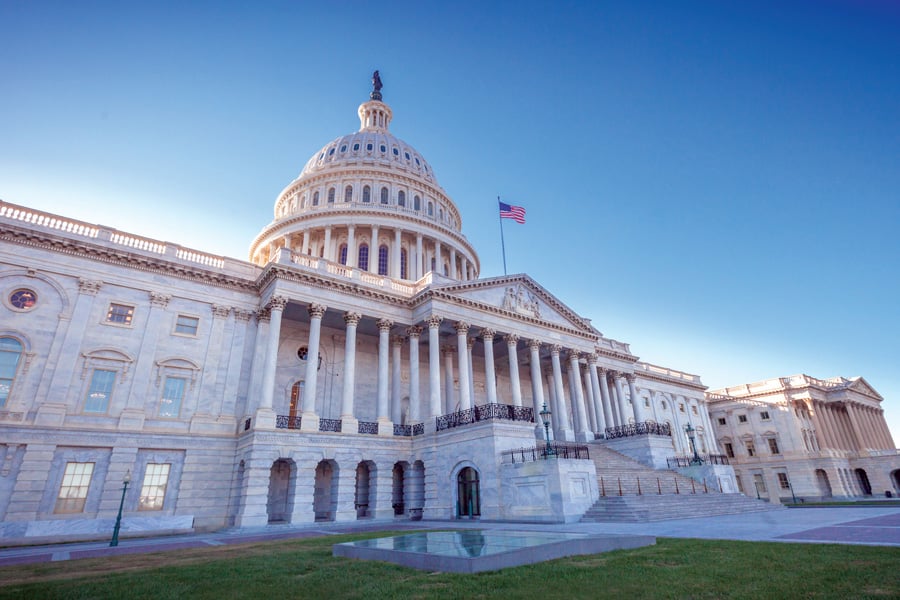

Initial legislative proposals responding to the trading frenzy in GameStop and other stocks earlier this year are creating partisan fissures.
As part of its third GameStop hearing on Thursday, the House Financial Services Committee posted discussion drafts of several bills that address different aspects of the phenomenon that saw GameStop, which had been shorted by hedge funds, soar from a valuation of $20 to $480 and back down again starting in late January.
The volatility raised questions about online forums, such as Reddit, and online trading apps, such as Robinhood, where much of the buzz and trading activity occurred.
Among the draft bills floated by committee Democrats are measures to require better disclosure of short positions; study the impact of so-called gamification of online trading platforms; and impose more requirements for options trading by retail investors. Another bill would prohibit payment for order flow, a process in which brokers route trades to certain market makers in return for compensation that allows them to reduce or eliminate commissions for customers.
During the GameStop hearing series, Democrats raised concerns about a lack of investor protection surrounding the trading spikes. For instance, some asserted that payment for order flow presents a conflict of interest for brokers that harms investors when the brokers don't obtain the best price for their trades.
The bills that were floated on Thursday were meant in part to signal to regulators testifying at the hearing — including Securities and Exchange Commission Chairman Gary Gensler — where Democrats are putting a policy emphasis.
“It is critical for our cops on the block at the SEC to protect investors and ensure that our markets are transparent and fair,” House Financial Services Committee Chairwoman Maxine Waters, D-Calif., said at the hearing. “Unfortunately, the previous administration’s appointees to financial regulatory agencies were often more interested in helping out Wall Street than protecting Main Street.”
Committee Republicans criticized the bills, saying they would crimp the increased market participation by ordinary investors that Robinhood and other firms have enabled through financial technology.
“We should not punish everyday American investors with a Democrat agenda that results in fewer investment options or forces folks to start paying to make trades again,” Rep. Patrick McHenry, R-N.C. and ranking member of the committee, said at the hearing. “So let’s go off of what we have learned. Let’s stand up for everyday investors and make it easier for them to invest.”
Gensler didn’t commit the SEC to a particular course of action regarding the GameStop trading. In written testimony, he outlined various ways the agency is exploring the issues that have been raised.
In exchanges with lawmakers on the committee, he said brokerage apps can expand access to capital for investors but the apps' features that encourage more trading could ultimately reduce returns. He said technological advances have outpaced regulatory responses.
“We need to look very seriously at freshening up our rules,” Gensler said, but he didn’t offer specifics.
Rep. Josh Gottheimer, D-N.J., asked Gensler whether conflicts of interest related to payment for order flow are too great to be resolved by disclosure alone.
“We know … this inherent conflict is there, and whether we can address it enough through disclosure or it sort of implicates the broader market structure” is something he’s asked SEC staff to assess, Gensler said.
Rep. Alexander Mooney, R-W.Va., asserted that overregulation would stifle market participation by retail investors.
“If we ban payment for order flow … I fear we may see the end of commission-free trading, and commission-free trading has been a driving force behind increased retail participation,” Mooney said.
The American Securities Association, which represents regional financial services firms, said in a May 6 letter to the committee that it supports several of the draft bills.
Bipartisan agreement could be found on some of them, including the one that directs the SEC to study the impact of gamification on online trading platforms, said Chris Iacovella, ASA chief executive.
“Both sides of the aisle benefit from more information,” he said.

AI is no replacement for trusted financial advisors, but it can meaningfully enhance their capabilities as well as the systems they rely on.

Prudential's Jordan Toma is no "Finfluencer," but he is a registered financial advisor with four million social media followers and a message of overcoming personal struggles that's reached kids in 150 school across the US.

GReminders is deepening its integration partnership with a national wealth firm, while Advisor CRM touts a free new meeting tool for RIAs.

The Texas-based former advisor reportedly bilked clients out of millions of dollars, keeping them in the dark with doctored statements and a fake email domain.

The $3.3 trillion tax and spending cut package narrowly got through the upper house, with JD Vance casting the deciding vote to overrule three GOP holdouts.
Orion's Tom Wilson on delivering coordinated, high-touch service in a world where returns alone no longer set you apart.
Barely a decade old, registered index-linked annuities have quickly surged in popularity, thanks to their unique blend of protection and growth potential—an appealing option for investors looking to chart a steadier course through today's choppy market waters, says Myles Lambert, Brighthouse Financial.
